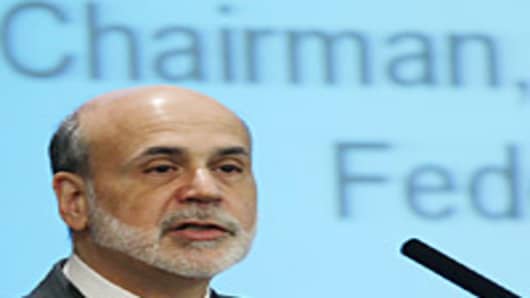After three years of monetary easing and unconventional policies to revive their economies from a recessionary slump, the U.S. Federal Reserve and the European Central Bank are now shifting the onus to politicians and urging them to fulfill their responsibilities.
Federal Reserve Chairman Ben Bernanke on Thursday failed to hint at further monetary easing, as was widely expected by the markets, and refused to be specific about future policy actions when he testified before a congressional committee. Instead, he urged American politicians to do something about getting the economy out of its doldrums.
Bernanke reiterated that monetary policy is "not a panacea" and urged Congress to address the issues that are standing in the way of an economic recovery.
His actions mirrored those of European Central Bank President Mario Draghi, who on Wednesday kept the region’s key interest rates unchanged.
"It would be much better to have a broad-based policy effort addressing a whole variety of issues," said Bernanke. "I leave the details to Congress, who have considered many of these issues." Bernanke added that he would be much more comfortable if Congress would "take some of this burden" from the Fed and address the economy's problems.
“What he did, by the way today, was what Draghi did [on Wednesday], he threw it right back at the politicians where it belongs,” Jack Bouroudjian, CEO of Bull and Bear Partners, an investment advisory and trading firm, told CNBC’s “Asia Squawk Box” on Friday.
According to Bouroudjian, Bernanke pointed the finger at Congress during his testimony. “Listen, Congress can do something too, you know?”
“(It) resonated with me and everybody I talk to…That was a very pointed remark,” Bouroudjian added.
Draghi too seems to be increasingly pushing back, urging Europe’s politicians to do more to solve a crisis that has continued to spread in the face of piece-meal solutions.
“Some of the problems in the euro area have nothing to do with monetary policy. And I don't think it is right for monetary policy to fill other institutions' lack of actions,” Draghi said on Wednesday.
One reason, both the Fed and the ECB may be hesitant to act, is that every additional round of quantitative easing (QE) risks being less effective. Some analysts believe, for example, that the last round of stimulus announced by the Fed in September 2010 had a minimal impact on the economy.
"I would argue that QE2 had absolutely no impact on the macro backdrop whatsoever," Tom Porcelli, Chief U.S. Economist at RBC Capital Markets, told CNBC. "I defy anyone to show me data that suggests that it did... It’s a fleeting event that has really no bearing on fundamentals."
In fact, the Fed and the ECB may be growing increasingly alarmed at the lack of policy actions from governments and lawmakers. The U.S., for example, faces a "fiscal cliff," with the expiry of Bush-era tax cuts, automatic spending cuts mandated by Congress and the end of extended jobless claims benefits, which could cut growth by around $600 billion or 3.8 percentage points.
To top it off, the country faces rising levels of debt from entitlement spending.
In his appearance on Capitol Hill, Bernanke urged Congress to do three things to put the budget on a sustainable long-run path: avoid the “fiscal cliff,” reach deficit-reduction goals and use tax policy to grow the economy.
“At best, rapidly rising levels of debt will lead to reduced rates of capital formation, slower economic growth, and increased foreign indebtedness,” Bernanke said. “At worst, they will provoke a fiscal crisis that could have severe consequences for the economy.”
By CNBC's Jean Chua.


